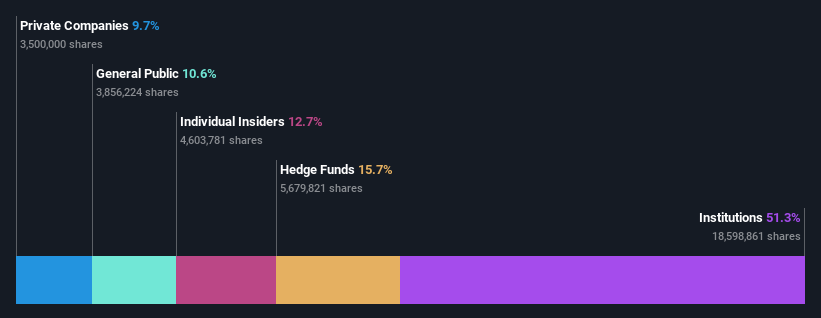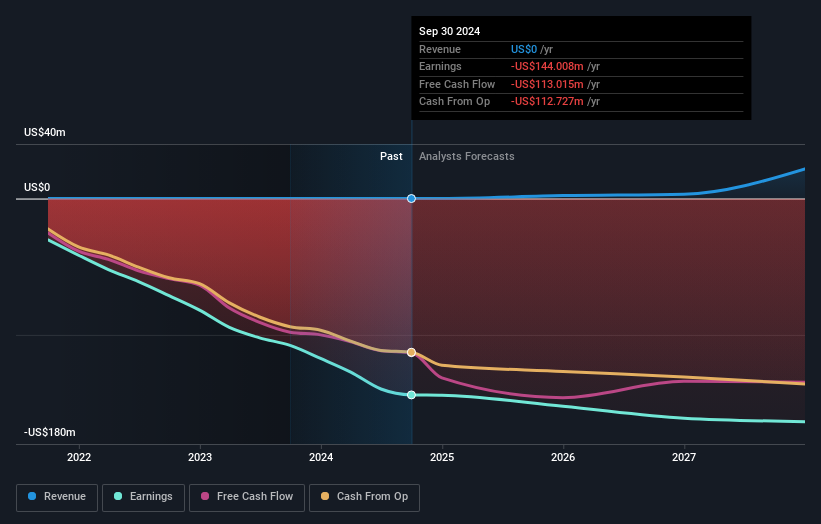- United States
- /
- Biotech
- /
- NasdaqGS:BMEA
Recent uptick might appease Biomea Fusion, Inc. (NASDAQ:BMEA) institutional owners after losing 75% over the past year

Key Insights
- Institutions' substantial holdings in Biomea Fusion implies that they have significant influence over the company's share price
- A total of 6 investors have a majority stake in the company with 54% ownership
- 13% of Biomea Fusion is held by insiders
Every investor in Biomea Fusion, Inc. (NASDAQ:BMEA) should be aware of the most powerful shareholder groups. We can see that institutions own the lion's share in the company with 51% ownership. That is, the group stands to benefit the most if the stock rises (or lose the most if there is a downturn).
After a year of 75% losses, last week’s 10% gain would be welcomed by institutional investors as a possible sign that returns might start trending higher.
Let's take a closer look to see what the different types of shareholders can tell us about Biomea Fusion.
Check out our latest analysis for Biomea Fusion

What Does The Institutional Ownership Tell Us About Biomea Fusion?
Institutions typically measure themselves against a benchmark when reporting to their own investors, so they often become more enthusiastic about a stock once it's included in a major index. We would expect most companies to have some institutions on the register, especially if they are growing.
Biomea Fusion already has institutions on the share registry. Indeed, they own a respectable stake in the company. This can indicate that the company has a certain degree of credibility in the investment community. However, it is best to be wary of relying on the supposed validation that comes with institutional investors. They too, get it wrong sometimes. If multiple institutions change their view on a stock at the same time, you could see the share price drop fast. It's therefore worth looking at Biomea Fusion's earnings history below. Of course, the future is what really matters.

Since institutional investors own more than half the issued stock, the board will likely have to pay attention to their preferences. Our data indicates that hedge funds own 16% of Biomea Fusion. That's interesting, because hedge funds can be quite active and activist. Many look for medium term catalysts that will drive the share price higher. The company's largest shareholder is FMR LLC, with ownership of 15%. For context, the second largest shareholder holds about 9.9% of the shares outstanding, followed by an ownership of 9.7% by the third-largest shareholder. Furthermore, CEO Thomas Butler is the owner of 6.9% of the company's shares.
We also observed that the top 6 shareholders account for more than half of the share register, with a few smaller shareholders to balance the interests of the larger ones to a certain extent.
While it makes sense to study institutional ownership data for a company, it also makes sense to study analyst sentiments to know which way the wind is blowing. Quite a few analysts cover the stock, so you could look into forecast growth quite easily.
Insider Ownership Of Biomea Fusion
The definition of an insider can differ slightly between different countries, but members of the board of directors always count. Company management run the business, but the CEO will answer to the board, even if he or she is a member of it.
I generally consider insider ownership to be a good thing. However, on some occasions it makes it more difficult for other shareholders to hold the board accountable for decisions.
Our information suggests that insiders maintain a significant holding in Biomea Fusion, Inc.. Insiders own US$18m worth of shares in the US$145m company. It is great to see insiders so invested in the business. It might be worth checking if those insiders have been buying recently.
General Public Ownership
With a 11% ownership, the general public, mostly comprising of individual investors, have some degree of sway over Biomea Fusion. This size of ownership, while considerable, may not be enough to change company policy if the decision is not in sync with other large shareholders.
Private Company Ownership
It seems that Private Companies own 9.7%, of the Biomea Fusion stock. Private companies may be related parties. Sometimes insiders have an interest in a public company through a holding in a private company, rather than in their own capacity as an individual. While it's hard to draw any broad stroke conclusions, it is worth noting as an area for further research.
Next Steps:
It's always worth thinking about the different groups who own shares in a company. But to understand Biomea Fusion better, we need to consider many other factors. Case in point: We've spotted 4 warning signs for Biomea Fusion you should be aware of, and 2 of them don't sit too well with us.
If you are like me, you may want to think about whether this company will grow or shrink. Luckily, you can check this free report showing analyst forecasts for its future.
NB: Figures in this article are calculated using data from the last twelve months, which refer to the 12-month period ending on the last date of the month the financial statement is dated. This may not be consistent with full year annual report figures.
Valuation is complex, but we're here to simplify it.
Discover if Biomea Fusion might be undervalued or overvalued with our detailed analysis, featuring fair value estimates, potential risks, dividends, insider trades, and its financial condition.
Access Free AnalysisHave feedback on this article? Concerned about the content? Get in touch with us directly. Alternatively, email editorial-team (at) simplywallst.com.
This article by Simply Wall St is general in nature. We provide commentary based on historical data and analyst forecasts only using an unbiased methodology and our articles are not intended to be financial advice. It does not constitute a recommendation to buy or sell any stock, and does not take account of your objectives, or your financial situation. We aim to bring you long-term focused analysis driven by fundamental data. Note that our analysis may not factor in the latest price-sensitive company announcements or qualitative material. Simply Wall St has no position in any stocks mentioned.
About NasdaqGS:BMEA
Biomea Fusion
A clinical-stage diabetes and obesity medicines company, focuses on the discovery and development of covalent small molecule drugs to treat patients with genetically defined cancers and metabolic diseases.
Medium-low with adequate balance sheet.
Market Insights
Community Narratives



